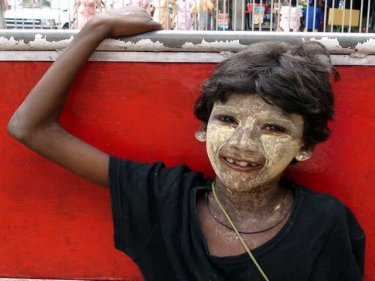CONCERN IS mounting about the fate of a large group of Burmese Muslim boat people who have been arrested in Phang Nga and trucked back to the border with Burma.
The Muslims, numbering about 80, landed on Koh Kor Khao on Wednesday and later told a migration officer that there had been deaths on board.
Three of the boat people were treated at Takuapa Hospital, in the district capital, an official confirmed. It is understood at least one patient had to be kept in the hospital because they were too sick to travel.
The district sheriff, who interviewed the group, said the boat people had been travelling for 11 days and were exhausted by their journey.
They had stopped on the island, a ferry ride from the fishing village of Nam Khem, to try to find food. But island villagers were alarmed at their arrival.
The migration officer, based in Ranong on the Thai-Burma border, told Phuketwan that the group would probably not be allowed to cross back into Burma.
They would most likely be forced to join other stateless refugees along the border, unwelcome in Thailand or Burma
A marine police officer said the ethnic group, known as Rohingya, had taken many days to sail to Thailand in an old wooden vessel with a small motor.
The boat people come from Rakhine State, which is in northwest Burma, close to the border with Bangladesh.
He said the group had been hoping to reach Malaysia, a predominantly Muslim country, but had been forced to land in Thailand instead.
In the past, as many as 1000 Rohingya had been apprehended at different times and trucked back, he said.
When large groups of people put to sea in boats not made for long journeys, especially minority groups, it's usually a sign of oppressive famine, hardship or persecution.
Phuketwan believes that authorities along the coast, including the Royal Thai Navy, have noted the increasing number of Rohingya among arrivals in recent months from Burma.
Standard proceedure is for Thai officials to carry illegal Burmese back to the border in open trucks. However, Burmese border guards are usually reluctant to let illegal travellers return to their homeland.
It is not apparent how people from northwest Burma could hope to return the hundreds of kilometres to their home state on foot.
A Phang Nga immigration officer said that the latest group had landed on the island and local villagers had been concerned, so they called in officials.
Many Burmese cross to Thailand legally and illegally to work for the minimum wage of less than 200 baht a day, constructing resorts or making concrete products.
The minimum wage in Thailand is four times what the average laborer can earn in Burma, if they can find a job.
The rising price of rice in Burma is forcing more Burmese to seek jobs by crossing illegally to neighboring countries. Most choose to travel by sea in the hope of escaping detection.
Burma and Thailand are predominantly Buddhist. While Thailand trades with Burma, border officials on both sides are less friendly.
The Muslims, numbering about 80, landed on Koh Kor Khao on Wednesday and later told a migration officer that there had been deaths on board.
Three of the boat people were treated at Takuapa Hospital, in the district capital, an official confirmed. It is understood at least one patient had to be kept in the hospital because they were too sick to travel.
The district sheriff, who interviewed the group, said the boat people had been travelling for 11 days and were exhausted by their journey.
They had stopped on the island, a ferry ride from the fishing village of Nam Khem, to try to find food. But island villagers were alarmed at their arrival.
The migration officer, based in Ranong on the Thai-Burma border, told Phuketwan that the group would probably not be allowed to cross back into Burma.
They would most likely be forced to join other stateless refugees along the border, unwelcome in Thailand or Burma
A marine police officer said the ethnic group, known as Rohingya, had taken many days to sail to Thailand in an old wooden vessel with a small motor.
The boat people come from Rakhine State, which is in northwest Burma, close to the border with Bangladesh.
He said the group had been hoping to reach Malaysia, a predominantly Muslim country, but had been forced to land in Thailand instead.
In the past, as many as 1000 Rohingya had been apprehended at different times and trucked back, he said.
When large groups of people put to sea in boats not made for long journeys, especially minority groups, it's usually a sign of oppressive famine, hardship or persecution.
Phuketwan believes that authorities along the coast, including the Royal Thai Navy, have noted the increasing number of Rohingya among arrivals in recent months from Burma.
Standard proceedure is for Thai officials to carry illegal Burmese back to the border in open trucks. However, Burmese border guards are usually reluctant to let illegal travellers return to their homeland.
It is not apparent how people from northwest Burma could hope to return the hundreds of kilometres to their home state on foot.
A Phang Nga immigration officer said that the latest group had landed on the island and local villagers had been concerned, so they called in officials.
Many Burmese cross to Thailand legally and illegally to work for the minimum wage of less than 200 baht a day, constructing resorts or making concrete products.
The minimum wage in Thailand is four times what the average laborer can earn in Burma, if they can find a job.
The rising price of rice in Burma is forcing more Burmese to seek jobs by crossing illegally to neighboring countries. Most choose to travel by sea in the hope of escaping detection.
Burma and Thailand are predominantly Buddhist. While Thailand trades with Burma, border officials on both sides are less friendly.




